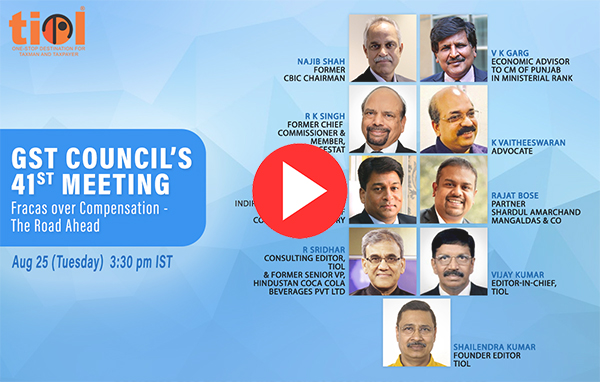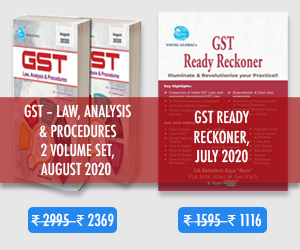|
SERVICE TAX
2020-TIOL-1291-CESTAT-MUM
TATA Aig Life Insurance Company Ltd Vs CST
ST - Issue for determination is the extent to which the definition of 'exempted services' in rule 2(e) of CENVAT Credit Rules, 2004 can be stretched to deny the availment of credit of tax paid on 'input services' procured by providers of 'insurance service' before the transformation of the tax regime to the 'negative list' paradigm - Controversy is whether the contract entered into by a policy holder with the insurer can be vivisected as separate services with identifiable consideration for each - Revenue asserts it to be so and if that hypothesis finds favour, the legal obligation under rule 6 of CENVAT Credit Rules, 2004 to maintain separate accounts of utilisation of some of the input services or to discharge liability on the value of the 'exempted service' binds the appellant.
Held: In the decision of SBI Life Insurance Co Ltd v. Commissioner of Central Excise, Mumbai [final order no. A/87354/2019 dated 18th December 2019 in appeal no. ST/85961/2015] , it has been held that the main part of the definition of 'exempted service' in rule 2( e) of CENVAT Credit Rules, 2004 clearly refers only to such taxable service as are exempt from the whole of the tax and, being fenced in by the definition of taxable services enumerated, for the disputed period, within section 65(105) of Finance Act, 1994, is not amenable to coverage of any service that is yet to be taxable - In consequence, it has been held that the inclusive component, pertaining, as they are, to 'services' which is without definition, can only be intended for such activities as cannot be taxed by recourse to List I of the Seventh Schedule in the Constitution of India - As the receipts excluded from computation of assessable value are not consideration for exempt services or may even lie outside the scope of inclusion as consideration, by being returnable to the policy holder, the disputed 'input services' does not come within the ambit of rule 6 of CENVAT Credit Rules, 2004 - Accordingly, the demand in the impugned order fails and the appeal is allowed. [para 13, 14]
- Appeal allowed: MUMBAI CESTAT
2020-TIOL-1290-CESTAT-KOL
CST Vs Kamal Mukherjee & Company Shipping Pvt Ltd
ST - The assessee was rendering Stevedoring Service in the Calcutta Port Trust area - The dispute is, whether the activity of stevedoring provided by assessee would be liable for Service Tax under the category of 'Port Service' - This issue stands decided by Larger Bench of Tribunal in case of Western Agencies Pvt. Ltd. 2011-TIOL-538-CESTAT-MAD-LB wherein it is held that the activity will be covered within the 'Port Service' - However, it has been pointed out that the controversy is far from finally settled - The Larger Bench's decision stands stayed by Madras High Court and several appeals on this issue are before Supreme Court - The appeal can be decided on the question of limitation - SCN has been issued on 13/10/2006 for the period 16/07/2001 to 31/03/2002 - From the SCN, is seen that the assessee did not apply for registration soon after the introduction of service; however, they applied for registration and commenced payment of service tax after the same was pointed out by Revenue during the enquiries - A perusal of the definition as it existed during the disputed period reveals that the term 'Port Service' does not refer to the activity of Stevedore - The assessee will be entitled to the bonafide belief, during the disputed period, that the activity carried out by them may not be covered within the definition of Port Service - Consequently, Revenue will not be justified in pressing the demand under the extended period of limitation - Since, no demand survives within the normal period of limitation, no justification found to interfere with the impugned order: CESTAT
- Appeal rejected: KOLKATA CESTAT
2020-TIOL-1289-CESTAT-CHD
Pernod Ricard India Pvt Ltd Vs CST
ST - The assessee is engaged in manufacture, sale and marketing of various brands of Indian Made Foreign Liquor (IMFL) and alcoholic beverages in India - They were getting the goods manufactured from various entities, which possesses the necessary liquor manufacturing licence from respected state governments - The department views that the assessee has either provided 'Business Auxiliary Service' to various bottlers by entering into contracts or the assessee has provided 'Franchisee Service' as mentioned under Section 65(105)(zze) of FA, 1994 - The matter is no longer res integra as the demand of service tax under category of Franchisee Service as the same has been settled in case of M/s Diageo India Pvt Ltd 2013-TIOL-790-CESTAT-MUM - Since the facts of this matter are similar to the one decided by said decision of Tribunal, after following the same, it is held that the demand under category of 'Franchisee Service' confirmed by adjudicating authority is not legally sustainable - So far, as the demand of service tax amounting to Rs. 14,75,497/- is concerned, same has been confirmed only on the two grounds that some of the invoices on which the cenvat credit was availed, was in the name of one of the branch of assessee which was not registered with Service Tax department or where the invoices were in the name of the Seagram Manufacturing Pvt Ltd. - It is a matter of record that Seagram Manufacturing Pvt Ltd has been merged with assessee's firm and therefore, on the invoices which are in the name of Seagram Manufacturing Pvt Ltd, legally cenvat credit of the service tax on such invoices cannot be denied to assessee as both the entities have merged together - The CCR, 2004 do not provide that input service needs to be received in the premises of output service provider, therefore, the cenvat credit cannot be denied on this ground also - The calculation of cenvat credit is calculated only on the basis that the assessee has not confirmed to limit of 20% as provided under Rule 6(3)(c) of CCR, 2004 on monthly basis - The utilization of cenvat credit for financial year 2005-06 and 2006-07 comes to 13.71% and 9.85% respectively - The percentage of utilization of cenvat credit is less than 20% as provided under Rule 6(3)(c) of CCR, 2004 and therefore no violation of Cenvat Rules found on this issue - There is no merit in impugned order, therefore, same is set aside: CESTAT
- Appeal allowed: CHANDIGARH CESTAT
CENTRAL EXCISE
2020-TIOL-1288-CESTAT-CHD
Priya Textiles Ltd Vs CCE
CX - The preventive staff of the department searched the premises of M/s Priya Textiles Ltd, M/s Uma Synthetics Ltd and M/s Manika Processors situated in the same compound at Amritsar - At the time of the visit of officers, the unit in the name of Priya Textiles Ltd was in operation and Uma Synthetics Ltd was not operational at the relevant time - After making necessary investigation, the department found a view that some violations have been done by appellants and thereby they have evaded the central excise duty - The appellant since very beginning has been claiming that the electricity charges were only towards the electricity used by them for fans/exhaust fans - The normal expenditure on electricity for lighting purchased which cannot by any stretch of imagination be equated with the use of power generation for processing of fabrics - There is no specific charge against the appellant that the processes such as washing, dyeing, mercerizing and printing were being carried out by them with the aid of power - The steam generated by appellant with the aid of boiler was used for the purpose of ageing of printed fabrics and as per condition of exemption notification the ageing of printed fabrics with the aid of steam is permissible in case of cotton fabrics - Since it has already been established that the majority of fabrics processed by appellants were of cotton and therefore, use of same in ageing the printed fabrics is legally permissible to appellant - For the period 1993-1994, 1995- 1996 and even prior to this period, the appellant was engaged in processing of cotton fabrics only - They had maintained proper record of fabrics received, processed and sold in a systemic way where the contents and nature of fabrics is categorically mentioned - The Department did not take note of the fact that most of the fabrics processed by appellant have mention of cotton fabric - There are no evidences to substitute the charge that the appellants were mainly engaged in processing of man made fabrics where only 16 entries of man made fabrics processed by the appellant is available out of 559 entries - The balance fabric was of cotton fabric only as per record - It is also a matter of record that electricity has been used by appellant only for lighting, fans and running of exhaust fans which cannot be equated to use of electricity/power in the processing of fabrics - The use of steam through boiler in the process of cotton fabrics is otherwise also permissible as per the conditions in the exemption notification - Assessee have not violated any of the condition of exemption notification - There is no misdeclaration as register of 'goods received and delivered' have specific mention of type of fabrics used in processing of such fabrics and, therefore, demand of Central Excise duty is absolutely on the flimsy ground and, therefore, the order under challenge is legally not sustainable: CESTAT
- Appeals allowed: CHANDIGARH CESTAT
2020-TIOL-1287-CESTAT-CHD
Plasser India Pvt Ltd Vs CCE
CX - The assessee is engaged in manufacture of Railway Track Maintenance Machines (RTMM) - These machines are being manufactured and exclusively cleared to the Indian Railway in terms of contract entered by assessee with Indian Railway - The assessee is subsidiary of Plasser and Theurer Group of Austria (for short Plasser) to whom the contract by Indian Railway for procurement of RTMM - In terms of contract, the imported components were to be supplied by Plasser Austria and the indigenous components were to be manufactured and integrated with imported components and the complete RTMM were to be supplied to assessee - The issue lies on a narrow compass as to whether the Cenvat Credit availed by assessee can be considered as the part of assessable value in terms of section 4 (1) (a) of Central Excise Act r/w Central Excise Valuation Rules - The issue stands decided in favor of assessee in case of Dai Ichi Karkaria Ltd. 2002-TIOL-79-SC-CX-LB - It is held that the duty paid on input which is file as a Cenvat Credit is not to be considered while arriving at a cost of such inputs - Therefore, the appeal is legally wrong on this count - Assessee has proved beyond the doubt at the strength of Chartered Accounting certificate and certificate from the Indian Railway that no incidence of duty has been passed on to buyers - Thus, the impugned order is not sustainable: CESTAT
- Appeal allowed: CHANDIGARH CESTAT
2020-TIOL-1286-CESTAT-CHD
Oswal Castings Pvt Ltd Vs CCE & ST
CX - Initially the assessee filed rebate claims for goods exported by them on account of Cenvat credit lying their account unutilized - Some rebate claims were sanctioned in cash, the some were allowed in their Cenvat credit account - As per Section 142(3) of Central Goods & Service Tax Act, 2017, the refund claims are to be sanctioned in cash; therefore, the assessee approached the adjudicating authority - The said request of assessee was rejected on 28.03.2018, but assessee got the said rejection letter only on 05.06.2018 - Against that order, assessee filed the appeal before Commissioner (A) on June, 2018 - The Commissioner (A) held that as they have not challenged the order of sanctioning the refund claim, therefore, the appeal is not maintainable - Moreover, the appeal filed by assessee against the order dt. 28.03.2018 is barred by limitation - When the assessee has approached the adjudicating authority for modification, it means that the assessee has not agreed with the adjudication order and when request for modification in adjudication order has been entertained and rejected and the same has been appealed against, in that circumstance, it is concluded that assessee has challenged the adjudication order of refund claim - Therefore, the appeal filed before Commissioner (A) is maintainable - The time consumed by adjudicating authority is required to be deducted from the time of filing the appeal before Commissioner (A) - If same is deducted, then the appeal filed before the Commissioner (A) is within time - Therefore, the appeal filed by assessee before Commissioner (A) is within time - Assessee is entitled to refund claim in cash: CESTAT
- Appeal allowed: CHANDIGARH CESETAT
2020-TIOL-1285-CESTAT-DEL
India Polyroads Pvt Ltd Vs CCE & C
CX - Area based exemption - A SCN dated 05.03.2012 was issued to the appellant that they are not eligible for the exemption under notification no.50/2003-CE inasmuch as they did not commence commercial production on or before 31.03.2010 and accordingly, the show cause notice sought recovery of the duty of Rs.72,19,776/- from them for the period from April, 2010 to September, 2011 along with interest thereon under Section 11 AB of the Central Excise Act and proposed imposition of penalty under Section 11 AC of the Central Excise Act, 1944 - demand confirmed, hence appeal.
Held: Appellant submitted that the matter is no longer res integra and in the precedent order of this Tribunal in Appeal No.E/53207 of 2015 vide Final Order No.57493/2017 dated 26.10.2017 the issue has been decided in favour of the assessee - inasmuch Tribunal observed that the production was started on 23.03.2010 for manufacture of the polymer based soil stabilizer - "Soiltech"; that initially, the assessee-Respondents have used the small tank, as the production was less and later, as soon as the demand increased, other bigger tanks were used for production and when this is so, then the assessee-respondents are entitled or the area based exemption as per Notification No.50/2003-CE dated 10.06.2003 - Bench had directed both the parties to inform the status report, if any appeal has been filed by the Revenue against the aforementioned final order of this Tribunal, within a period of 10 days - As no such report is filed, it appears that Revenue has accepted the Tribunal's order - therefore, following the precedent order of this Tribunal, Bench allows this appeal by setting aside the impugned order: CESTAT [para 4]
- Appeal allowed: DELHI CESTAT
CUSTOMS
2020-TIOL-1284-CESTAT-HYD
CC, CE & ST Vs Integrated Broadcasting Pvt Ltd
Cus - Appeal filed by Revenue is seeking enhancement of redemption fine and penalty on the imported goods imposed by adjudicating authority in the impugned order - The assessee's appeal is seeking setting aside of both the fine and penalty imposed upon them by the adjudicating authority in the impugned order - In this case, the redemption fine involved is Rs. 2,50,000/- and penalty of Rs. 30,000/-, therefore, without discussing the merits of appeal, the Customs appeal is rejected in terms of litigation policy - Assessee had indeed removed the goods without permission of Customs Officers and in fact without even filing the required bill of entry or paying duty on the goods - After such removal, they filed bill of entry which, when ordered for examination, brought out the fact that the importer has removed the goods without payment of duty and the custodian had given them the goods - The value of goods declared was Rs. 83,13,505/- - The maximum redemption fine imposable on confiscation is equal to the market value of the goods - However, the adjudicating authority has imposed a fine of only Rs. 2,50,000/- - The penalty which is imposable under section 112 is equal to the value of the goods - However, the penalty which is imposed, is a small fraction of the value of the goods i.e. Rs. 30,000/- only - Therefore, both fine and penalty are fair and not unreasonable - However, reduction of redemption fine from Rs. 2,50,000/- to Rs. 2,00,000/- and penalty from Rs. 30,000/- to Rs. 25,000/- would meet ends of justice: CESTAT
- Revenue's appeal dismissed: HYDERABAD CESTAT |
|







